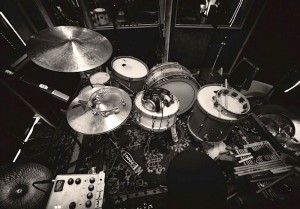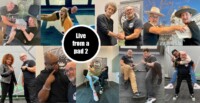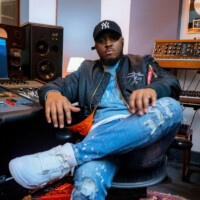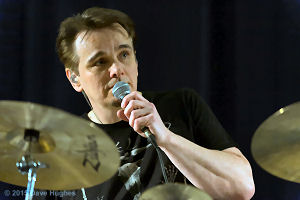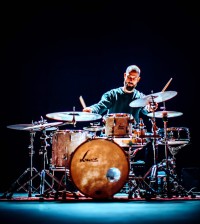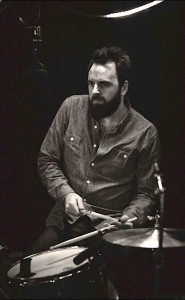 Dublin bred Graham Hopkins was surrounded by music from a very young age. Born into a musical family – his dad is a drummer too – he grew up to develop a versatile taste and understanding of music.
Dublin bred Graham Hopkins was surrounded by music from a very young age. Born into a musical family – his dad is a drummer too – he grew up to develop a versatile taste and understanding of music.
From his first ventures with his band My Little Funhouse straight out of school; over his years with British Alternative Rock legends Therapy?; all the way to his most recent gig with Glen Hansard, Graham serves every style perfectly and has become an in-demand session drummer far beyond the borders of Ireland.
Artists like Snow Patrol, the late Dolores O’Riordan (The Cranberries),The Swell Season, Gemma Hayes, Tom Jones, The Frames and many more have been backed by his solid grooves since.
Outside his work with artists and bands, Graham has a deep passion for sharing his accumulated knowledge and has created a unique environment surrounding his ‘Drum Hangs’ in Ireland. Broadening his reach, he is currently preparing for clinic tours around the UK and will be performing at this years UK Drum Show in Manchester.
I sat down with Graham to talk about his upbringing and his journey through various musical genres.
You grew up listening to Dixieland jazz. That doesn’t sound like a very Irish thing?
It’s the polar opposite. There’s very little Dixieland being played in Ireland today. If there is a Dixieland scene, it’s led by my dad and any other older gentlemen playing with him. They’re great musicians but they don’t really have a huge back-catalogue, so my father introduces them to songs.
Your dad is a musician too?
Yes, he’s a drummer. He actually lived here in Manchester for a lot of his upbringing and spent his formative years in the UK trad and Dixieland jazz circuits. There was a huge scene of that especially in the ’50s and ’60s before the Beatles kicked in. My father was part of that.
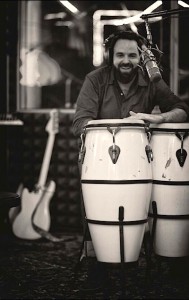 So he has been a big influence on your musical upbringing?
So he has been a big influence on your musical upbringing?
Yeah and he still is. In my youth, I was into rock and indie music and I feel in recent years I’m re-visiting my love of Trad jazz. It has impacted my drumming a lot over the last three to four years. As I’m getting older I’m returning to it more, listening to more albums and players. I feel really passionate about it and it’s all my father’s fault really. I can really appreciate how that style has influenced contemporary styles of music across the board. I was very fortunate that as a kid, drummers like Baby Dodds, Zutty Singleton and Gene Kruppa were everyday names mentioned in my house!
Did you learn your first steps on the drum kit from him too?
I never really got a lesson off him at all and he never said “You’re going to be a drummer. You have to go to lessons”. The only ever technical thing he taught me was a paradiddle – he actually wrote it on the garage wall – everything else was just going to see him play all sorts of gigs. I was constantly by his side observing it all. It was a great musical upbringing, and they were really eclectic gigs. He’d be playing a jazz gig one day, then a wedding, a Bar Mitzvah and then a funeral. The full spectrum. There was no better musical upbringing to have.
I also was an avid reader of all the drum mags and poured over every last detail of the drummers that were featured and the gear they used. This led me to buying lots of albums that the drummers played on. For example Led Zeppelin with Bonham; Steely Dan with Gadd, Purdie, Porcaro; Thin Lizzy with Downey – the king of the shuffle! and of course The Band with the great Levon Helm. There’s too many more to mention!
You went from school straight into My Little Funhouse – and straight on an America tour supporting Guns N’ Roses. How did you handle the leap from going from the school band to sitting on the big stage straight away?
Well, it was totally surreal but all I ever wanted really. I suppose I reacted to it like every 17-year-old would. It was just a: Woah!!!. You know, two weeks beforehand I was in school thinking all I want to do is play music professionally – the week later I was there living in Los Angeles, playing with these people. It was surreal but I think I handled it pretty well. I was doing the same thing that everybody of our age was then: I went out getting drunk every night, but I was still overly passionate about playing the drums and improving on my instrument at the same time.
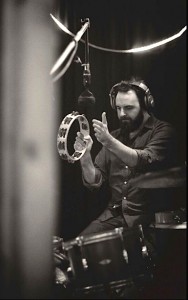 You moved to L.A. with the band?
You moved to L.A. with the band?
Yeah. When I joined, the band was already signed to Geffen and had an album out.
Because of the connection to Guns N’ Roses their management approached My Little Funhouse and offered to manage them too – which was crazy! One of the request though was moving to Los Angeles and recording the next album there. Of course none of us had any problem with moving to L.A. at that age and it was amazing. We had a great time doing several tours – the most memorable one for me being with The Ramones – which was great.
At some point the whole ‘Nirvana on Geffen’ kicked in but we had Guns N’ Rose’s management, so there was a musical conflict. Me and the bass player (who was my best friend) were definitely more into the grunge scene rather than the hard Guns N’ Roses rock’n’roll. We would have liked to be associated more with the grunge scene but at the same time we had no problem with living in L.A. and hanging out with people there. We had guys visiting us in the studio because of people who were producing the demo’s we were recording. Alice In Chains came in and we just couldn’t believe it. A few weeks beforehand we were at their gig in Dublin and only a couple of months later we were hanging out with them. For a 17-year-old it was beyond surreal.
How come the move back to Ireland then?
Well, I left the band three years later after we had recorded two more albums neither of which got released by Geffen. Musically it just wasn’t for me at all anymore so I moved back to Ireland. Drumming-wise it taught me a lot because I had been on so many sessions with so many producers at such a young age. Especially my playing to a click; I had never done that before. So yeah, I improved a lot but the band wasn’t the right thing for me musically.
You didn’t consider staying in Los Angeles?
The whole band moved home and the next step for me was to get out of the band.
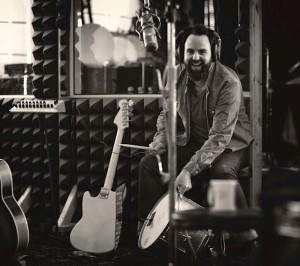 And your next big band was Therapy?
And your next big band was Therapy?
Yeah and they were already a big established band. We did so much touring and headlined loads of festivals all over Europe. I was in the band six or seven years before I left them in 2001. That was a really busy and influential time of my life. The band was really driven and we were constantly recording, touring, and playing huge festivals. It was a very productive time for me.
It was full on playing – I don’t really know what to call it – pop/punk, rock, sometimes fairly industrial. It was a great time with great guys, and that again taught me so much.
The band had three albums out already – Troublegum being the really big one – and I joined the band touring an album called Infernal Love. There was a big fan base already and especially in places like Germany, Holland and Belgium we were playing really big gigs and headlining festivals. I was also recording several albums over those years and had a great time. After a while it (again) musically just wasn’t the right thing for me. You know, I had my time, I had my fun and I wanted to move on. The guys were really understanding. At the same time I was in Therapy whenever I had time off from touring, I was doing other sessions and making music with other people as well.
I found Therapy described as ‘alternative metal’ but from there most of your next artists were pretty ‘folky’. Was that a matter of maturing or calming down a little bit?
I don’t think it was a conscious decision to become more folky. The scene in Ireland is very eclectic. You can have your singer/songwriters but you also have your Alternative Metal bands, your pop bands, a jazz scene and everything else. My thing has always been covering all boards. I play anything and everything and it just so happens that the social scene of where I was drinking at the time, so many friends were singer/songwriters. When I left Therapy I was just asked to do several sessions with a lot of people – of course I said yes right away. It just snowballed from there and I did a bunch of recordings, gigs and tours with singer/songwriters. Yeah, I was having a lot of fun because I did several years of hitting the drums so hard.
For the last couple of years your main gig has been Glen Hansard. That was pretty folky as well, wasn’t it?
It was quite folky yes, but not too much. For the live gig there was 14 of us in the band so it got quite full on without a doubt. It was actually very soulful and touched all bases musically. There is a horn section, strings, keys, guitar and bass, Glen plays guitar and sings. Because Glen won an Oscar with Marketa Irglova for the movie ‘Once’ a few years ago it propelled him internationally so we got to play all over the world in dream venues like Sydney Opera House, Hollywood Bowl, Radio City and so on.
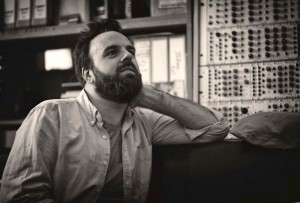 “Touches all bases musically” sounds pretty challenging – in a good way.
“Touches all bases musically” sounds pretty challenging – in a good way.
Yes absolutely and that’s it. It certainly never got boring. Even when he plays a very mellow song I love the challenge of playing as light as a feather. People would think it’s boring but I think it’s as far from boring as you can get. I always think of drummers like Jim Keltner in that kind of way. You’re just playing as soft as you can but you have to really support the song so much. You have to play the vibe, the tempo, keep your eyes on the singer/songwriter as far as the feel and the lyrical content goes. The main thing that I’ve always taught is not to think about what fill am I gonna play next or what bass drum pattern I’m gonna play, I just always try to close my eyes and feel out the song. Never overly self-obsessed with what I’m going to play. That’s just my particular personal way of playing.
You have left the Glen Hansard gig for now though?
Yes, for the moment I have decided to take a break from being on the road. He’s touring the album ‘Between Two Shores’ at the moment which we recorded in Wilco’s studio in Chicago and which was released in January but I’ve decided not to tour it because I’ve been busy at home recording sessions. Glenn Kotche from Wilco gave me the choice to use any of his drums in the studio which made the recording so much fun for me. There were numerous vintage kits to choose from along with C&Cs. There were also loads of vintage cymbals and percussion to play with.
I have absolutely loved playing with Glen for so many years but I just want to get to this place where I can play and tour with as many artists as I can. I’m looking forward to that over the next couple of months.
You are quite a gear head with an impressive drum collection. How did that passion come about?
Yes I am. I guess it just came about through the passion for drums and because of my father. Since day one there has always been gear around the house. The more gear, the merrier.
I don’t have close to as many kits as, for example, Jeremy Stacey, but I do have kits that I haven’t played in years. I do feel very protective of them and I know it’s ridiculous but I don’t want to get rid of any of them!
Sometimes I look at all my snares – and I do have a lot of snares, I even have two of the same snare drums – and I think: Why would I get rid of this, one sounds better than the other! Realistically though I thought about doing various tests with a blindfold on to see if I even notice a difference! Then I could hold on to whatever I sincerely like and get rid of the rest – or leave some in studios I go to regularly so they’re being used rather than just lying dormant in a lock-up.
I have various studio sessions and gigs with different artists both in Ireland and internationally.
For example, I’m doing some work with a great artist called David Keenan – who is definitely one to look out for. I first heard of him three or four years ago and he’d given me shivers – then he asked if I would play drums with him so that’ll keep me busy.
Adam Marcello (Katy Perry & American Idol) and I are planning some ‘drum hangs’ together. I call them drum ‘hangs’ as opposed to clinics or masterclasses because they are much more casual and laid back than rows of seats and me sitting on a stage.
Thanks a lot for your time Graham!
Interview by Tobias Miorin
Photos by Zoran Orlic
April 2017

